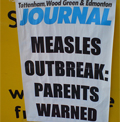 A surge in new cases in Danish adults has been recorded since the beginning of the year, while public health authorities in Switzerland have reported a sudden increase in measles. Norwegian authorities have also expressed concern at a spike in childhood measles reported in recent weeks.
A surge in new cases in Danish adults has been recorded since the beginning of the year, while public health authorities in Switzerland have reported a sudden increase in measles. Norwegian authorities have also expressed concern at a spike in childhood measles reported in recent weeks.
This week, US officials warned air travellers about possible exposure to measles after a woman flew from London to several US states. The 27-year-old was later found to have been infected with the measles virus, leading health authorities to contact passengers to advise them of the risk.
The episode illustrates the speed with which viruses can spread across the globe in the aviation age. The WHO Europe said it plans to highlight the fact that “vaccine-preventable diseases have no respect for border”.
This comes just weeks ahead of European Immunization Week 2011 (23 – 30 April) which will focus on ‘shared solutions to common threats’.
The WHO says an upsurge in measles cases has also been seen in Germany, the Netherlands, Serbia and the former Yugoslav Republic of Macedonia. “France experienced nearly 1,000 measles cases just in the month of January,” according to the EIW blog.
Finding cross-border solutions to infectious diseases has climbed up the agenda of health policymakers since the WHO declared an influenza pandemic in 2009 for the first time in more than half a century.
Last year, increased numbers of measles infections in Turkey and the Russian Federation were linked to earlier outbreaks in Bulgaria and Uzbekistan, respectively. In Brussels, EU officials have grown more conscious of the need improve public health measures in Europe but also of the importance of cooperating with neighbouring nations.




